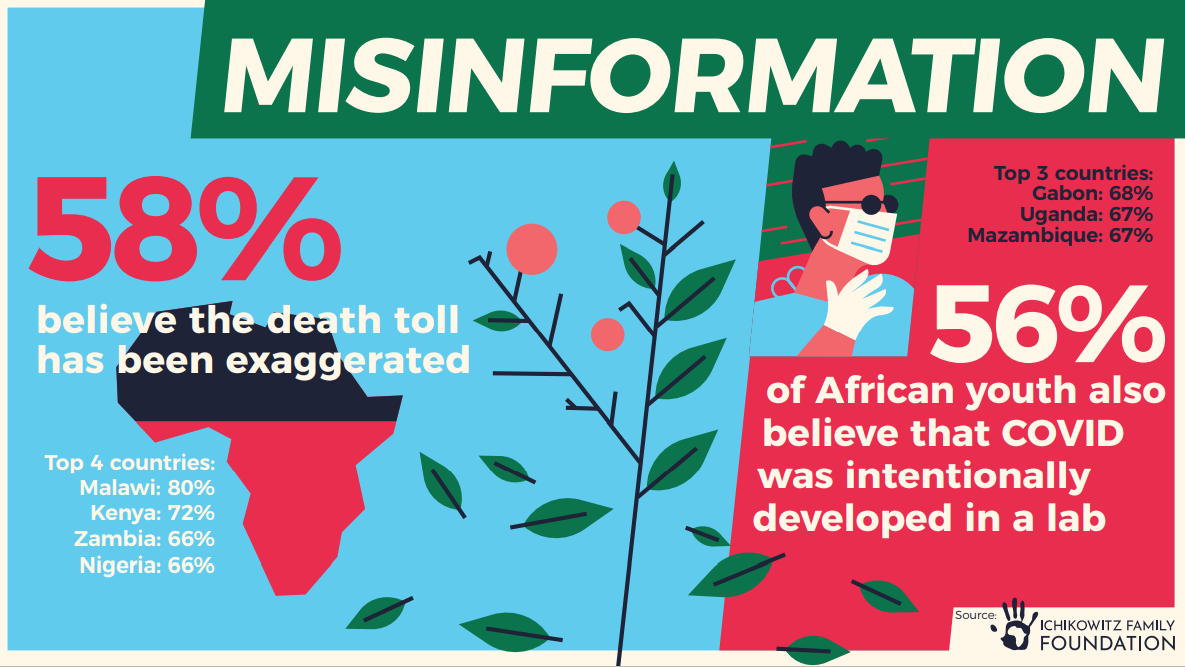New Research Across 15 African countries and 4,500 youths has revealed devastating impact of COVID-19, vaccine apathy and fake news
As the virally-transmissible ‘Delta’ variant of COVID-19 surges across the African continent, findings from the Ichikowitz Family Foundation’s 2021 African Youth Survey has revealed that over half of the continent’s young people found themselves unemployed or had to pause or stop outright their education in the wake of the pandemic.
According to the African Youth Survey, the most comprehensive survey of African youths, nearly four out of ten (37%) youths polled across the continent had to stop or pause their schooling; nearly two in ten (19%) became unemployed as a socioeconomic ramification of the pandemic and 18% were forced to move back home.
One in ten (10%) surveyed reported they had to care for family members, 8% had their pay docked, while 7% suggested that they were forced to enter the informal economy or take on an additional job to pay their bills.
The economic impact of COVID-19 has been worsened by the state of ‘vaccine apathy’ presently plaguing the continent. The survey reports that nearly four in ten (39%) young African men and women polled would probably not or definitely not take the vaccine, if given the opportunity.
This is reflected in the levels of confidence, with 37% of youths not confident that their countries will have access to a safe and effective vaccine.
While they are split on what the focus should be for their countries, a plurality (39%) believe that reopening their economy should be considered the highest priority for governments; 29% believe preventing the spread of COVID-19 should be prioritized and 28% maintain that the priority should be vaccine distribution.
Fake news and misinformation about COVID-19 is rife. Over half (58%) polled believe the death toll thus far reported by news outlets has been exaggerated to further political agendas. Nearly six in ten (56%) believe COVID-19 was developed in a laboratory and intentionally spread by the Chinese government. Almost four in ten (37%) believe that young people are immune to the disease and 34% contend that 5G technology has been contributing to the spread of COVID-19.
Despite the prevalence of vaccine apathy, youths across the continent express varying degrees of approval for the way their respective governments have handled their responses to the COVID-19 pandemic. While a 63% majority approve (strongly or somewhat) of how their national government is presently handling its response to the outbreak, nearly 20% strongly disapprove in contrast.
The vast majority (85%) of African youths polled are today very or somewhat concerned about the spread of infectious disease. Nearly twice the amount of those polled in 2019, when compared to the African Youth Survey’s inaugural findings in 2020, have suggested that death from infectious disease should be viewed as the most impactful event which has occurred on the continent in the last five years.

Ivor Ichikowitz, Chairman of the Ichikowitz Family Foundation, stated: “Despite our future potential as a geo-commercial and political power in the world, Africa faces diverse yet escalating challenges, each exacerbated by the COVID-19 pandemic. Ours remains the continent with the least amount of vaccines and the weakest healthcare systems.”
“While African young people have historically faced acute unemployment, their future prospects have been dramatically compounded by the COVID-19 virus. More than half of our next generation report in our survey that they need to pick up the pieces of their lives as a result of the pandemic’s impact.
“It is very worrying that nearly 40% of young people are saying that they won’t take a vaccine. This should be a cause of great concern for governments and health authorities as they are battling to fight the spread of the Delta variant. This is further exacerbated by our findings showing high levels of misinformation about the origins, spread and mortality rate of COVID-19.”
In step with its inaugural 2020 rendition, the African Youth Survey 2021 will investigate the views, hopes and aspirations of the continent’s young people on the most pressing, contemporary issues that they face.
Topics will range from the impact and legacy of COVID-19 to contemporary education, the embrace of the digital revolution and the rise of e-commerce.
From perspectives on maintaining stability against terrorism, crime and other threats to security and peace, migration and refugee issues; from appreciation for democracy to community tolerance; from addressing corruption to fostering a climate for entrepreneurism and innovation to thrive; from opinions on the economic potential of the newly-formed African Continental Free Trade Area (AfCFTA) to perceptions of foreign influencers.
“In many countries in Africa, we are bearing witness to the ramifications of ingrained economic and social dislocations which have been brought under a very public microscope as a result of the pandemic.
As reflected on the streets of South Africa in recent months, there is an unprecedented urgency to address these rifts. However, we must view this moment as an opportunity to address the longstanding divisions and infrastructural constraints to growth. It is up to all of us to rise to the occasion to lift the continent to a higher, more inclusive and sustainable growth path,” Ichikowitz pointed out.


1 comment
great post, very informative. I wonder why the other specialists of
this sector don’t notice this. You should proceed your writing.
I’m confident, you’ve a huge readers’ base already!